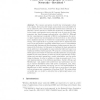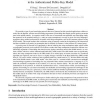13 search results - page 1 / 3 » Commutativity, Associativity, and Public Key Cryptography |
IMCSIT
2010
13 years 2 months ago
2010
We will consider balanced directed graphs, i.e., graphs of binary relations, for which the number of inputs and number of outputs are the same for each vertex. The commutative diag...
CORR
2007
Springer
13 years 4 months ago
2007
Springer
There are several public key establishment protocols as well as complete public key cryptosystems based on allegedly hard problems from combinatorial (semi)group theory known by no...
ESAS
2004
Springer
13 years 10 months ago
2004
Springer
The common perception of public key cryptography is that it is complex, slow and power hungry, and as such not at all suitable for use in ultra-low power environments like wireless...
CORR
2006
Springer
13 years 4 months ago
2006
Springer
We consider a type of zero-knowledge protocols that are of interest for their practical applications within networks like the Internet: efficient zero-knowledge arguments of knowl...
EUROCRYPT
1998
Springer
13 years 9 months ago
1998
Springer
Abstract. First, we introduce the notion of divertibility as a protocol property as opposed to the existing notion as a language property (see Okamoto, Ohta [OO90]). We give a defi...



